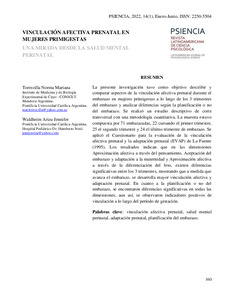Por favor, use este identificador para citar o enlazar este ítem:
https://repositorio.uca.edu.ar/handle/123456789/15352| Título: | Vinculación afectiva prenatal en mujeres primigestas: una mirada desde la salud mental perinatal | Autor: | Torrecilla, Norma Mariana Waldheim, Jennifer Emilie |
Palabras clave: | VINCULOS; MUJERES; EMBARAZO; EDAD GESTACIONAL; AFECTOS | Fecha de publicación: | 2022 | Editorial: | Asociación para el Avance de la Ciencia Psicológica | Cita: | Torrecilla, N. M., Waldheim Arizu, J. Vinculación afectiva prenatal en mujeres primigestas: una mirada desde la salud mental perinatal [en línea]. PSIENCIA. 2022,14 (1). Disponible en: https://repositorio.uca.edu.ar/handle/123456789/15352 | Resumen: | Resumen:
La presente investigación tuvo como objetivo describir y
comparar aspectos de la vinculación afectiva prenatal durante el
embarazo en mujeres primigestas a lo largo de los 3 trimestres
del embarazo y analizar diferencias según la planificación o no
del embarazo. Se realizó un estudio descriptivo de corte
transversal con una metodología cuantitativa. La muestra estuvo
compuesta por 71 embarazadas, 22 cursando el primer trimestre,
25 el segundo trimestre y 24 el último trimestre de embarazo. Se
aplicó el Cuestionario para la evaluación de la vinculación
afectiva prenatal y la adaptación prenatal (EVAP) de La Fuente
(1995). Los resultados indican que en las dimensiones
Aproximación afectiva a través del pensamiento, Aceptación del
embarazo y adaptación a la maternidad y Aproximación afectiva
a través de la diferenciación del feto, existen diferencias
significativas entre los 3 trimestres, mostrando que a medida que
avanza el embarazo, se desarrolla mayor vinculación afectiva y
adaptación prenatal. En cuanto a la planificación o no del
embarazo, se encontraron diferencias significativas en todas las
dimensiones, aun así, se observaron indicadores positivos de
vinculación a lo largo del período de gestación. Abstract: The objective of this research was to describe and compare prenatal affective bonding aspects during pregnancy in primigravid women throughout the 3 trimesters of pregnancy and to analyze differences according to whether or not the pregnancy was planned. A descriptive cross-sectional study was carried out with a quantitative methodology. The sample consisted of 71 pregnant women, 22 in the first trimester, 25 in the second trimester and 24 in the last trimester of pregnancy. The Questionnaire for the evaluation of prenatal affective bonding and prenatal adaptation (EVAP) of La Fuente (1995) was applied. The results indicate that in the dimensions Affective approach through thought, Acceptance of the pregnancy and adaptation to motherhood and Affective approach through the differentiation of the fetus, there are significant differences between the 3 trimesters, showing that as the pregnancy progresses, greater affective bonding and prenatal adaptation develops. Regarding the planning or not of the pregnancy, significant differences were found in all dimensions, even so, positive indicators of linkage were observed throughout the gestation period. |
URI: | https://repositorio.uca.edu.ar/handle/123456789/15352 | ISSN: | 1851-9083 2250-5504 (online) |
Disciplina: | PSICOLOGIA | Derechos: | Acceso abierto | Fuente: | PSIENCIA. Vol. 14,N° 1, 2022 |
| Aparece en las colecciones: | Artículos |
Ficheros en este ítem:
| Fichero | Descripción | Tamaño | Formato | |
|---|---|---|---|---|
| vinculación-afectiva-prenatal.pdf | 166,3 kB | Adobe PDF |  Visualizar/Abrir |
Visualizaciones de página(s)
375
comprobado en 27-abr-2024
Descarga(s)
816
comprobado en 27-abr-2024
Google ScholarTM
Ver en Google Scholar
Este ítem está sujeto a una Licencia Creative Commons

